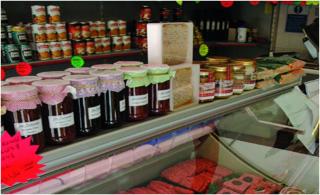How to expand the market for ethical food products?
Published on 19 July 2011 in Sustainability and Communities

Introduction
The category of ethical food products encompasses all those products that actively seek to minimise social and/or environmental damage with ecological integrity and social justice values at the core of their characteristics. Therefore, ethical food and drink could be seen as a subset of sustainable food production with “local and green” and “global and fair” focus.
The figures below present the evolution of consumption of different ethical food categories expressed as percentages of the UK household expenditure on food and non-alcoholic drinks. Amongst them fair-trade, poultry and eggs and fish products consumption shows an increasing trend while consumption of the organic, farmers’ markets and vegetarian products seems to stagnate since 2007. The slight drop in the latter categories could be related to a low carbon diet trend noted in recent years especially in the group of most affluent consumers.
This note discusses ways in which the market of ethical food can be expanded based on lessons extracted from several pieces of research carried out by SAC Food Marketing Research team.
.jpg)
Key Points
Marketing strategy considerations for ethical food are discussed using marketing mix framework:
Price – Ethical values of food come in most cases at significant cost. Resulting prices can significantly impair extension of the ethical food niche or its introduction into larger markets with limited purchasing power. Based on SAC research we anticipate two different solutions: one is to decrease costs of production and marketing of ethical food using either science and technology or economic efficiency of scale. The second solution is to communicate ethical values as those that in short term cost more but bring considerable values in the future for both an individual consumer and local community.
Place – Distribution costs of expanded ethical food supply are likely to increase products unit price so there is a need for effective communication to consumer in order to promote acceptability of prices. SRUC research indicates that successful introduction of a typical products to certain regions of Scotland is possible (e.g., Isle of Sky, Cairngorms). Major critical factor behind such success stories is existence of strong local initiatives that help with development of local and remote (mail order, e-commerce) markets.
Promotion - Ethical food can benefit from generic promotion of its values e.g. organic, fair trade, and local umbrella brand. Trust factor is very strong in case of local food which can not only be identified by its origin but also by individual producer/farmer. SRUC EuroMarc research shows that consumers who appreciate knowledge of food, its production and origin, seek direct encounter with sellers – be that farmers at a market or an owner of small shop.
People – form the link between all aforementioned elements of ethical food marketing.
SRUC research into sustainable and local food shows that people focus is crucial in all marketing actions leading to expansion of ethical food market:
- understanding people (to identify set of ethical attributes),
- create values for people (so they can accept premium prices for ethical products),
- communicate values (educate them about the products and persuade them to buy), and
- deliver values to people (so they can access and afford them).
Research Undertaken
The information presented in this article comes from two sources: first, from part of the results of the 2005-2010 Scottish Government Research Programme 3, researching sustainability of several Scottish agri-food supply chains
The second source of information was the EU-FP6 Project European Mountain Agrofood products, Retailing and Consumers (EuroMARC).
Policy Implications
The complexity of issues revealed by results of SRUC investigation indicates that the development of the market for ethical food has to be addressed from the perspective of the whole food supply chain.
As the ethical food provision leads to additional costs and higher price premiums, the two crucial areas of action arise: 1) reduction of costs of ethical food production (leading to lower prices); 2) communication of ethical values to the consumer.
Reduction of costs of the ethical food supply has already started as at the farm level, many farmers are already seeking more sustainable production systems, particularly in economic and environmental terms (e.g. better use of energy and fertilisers, greater use of waste products, shorter production cycles, investment in renewable energy sources, development of bio-diverse areas, etc.) but there is a need for greater guidance and assistance with developing more sustainable systems. This should cover certain forms of investment, training and knowledge transfer on new processes and good practices, and collaborative action with downstream parts of the chain.
At present communication of ethical values, corporate and government efforts to demonstrate sustainability and ethics of food production are considered inadequate. Communication and consumer education efforts should be co-ordinated and controlled in order to avoid confusion in “over-labelled” food market. At the same time legislation effort should ensure that ethical food claims are genuine and trusted by “ethical consumers”.
Authors
Cesar Revoredo-Giha Cesar.Revoredo@sruc.ac.uk
Beata Kupiec-Teahan Beata.Kupiec@sruc.ac.uk
Philip Leat Philip.Leat@sruc.ac.uk
Chrysa Lamprinopoulou-Kranis Chrysa.Lamprinopoulou@sruc.ac.uk
Topics
Sustainability and Communities







